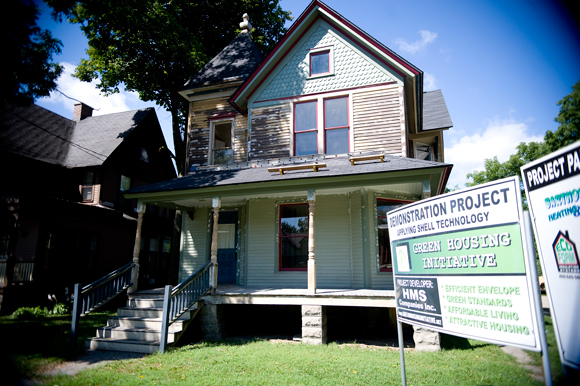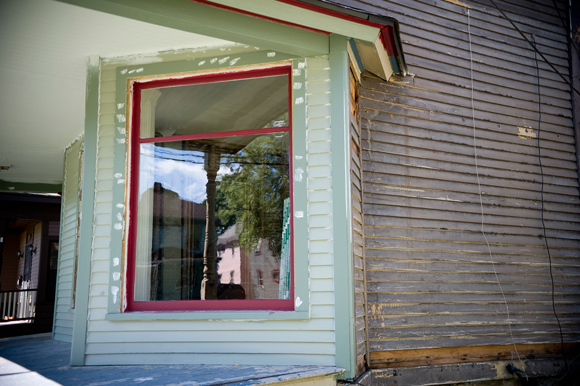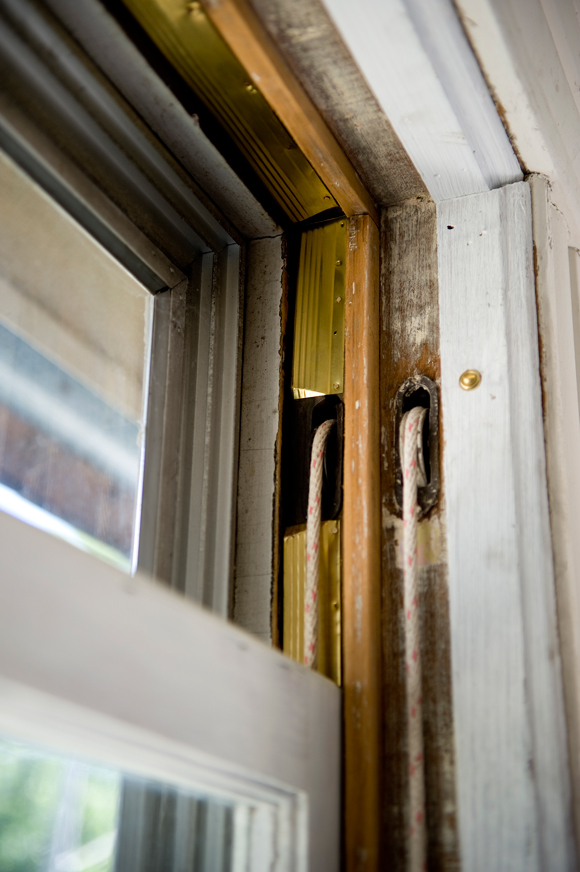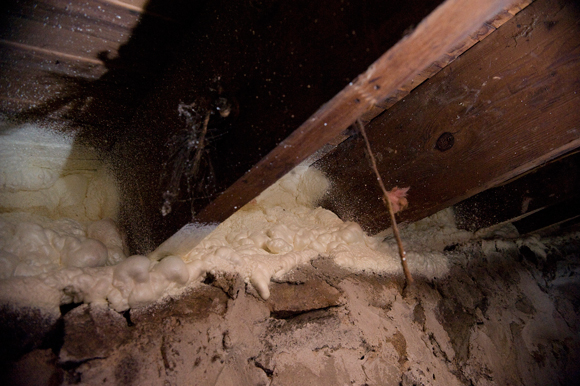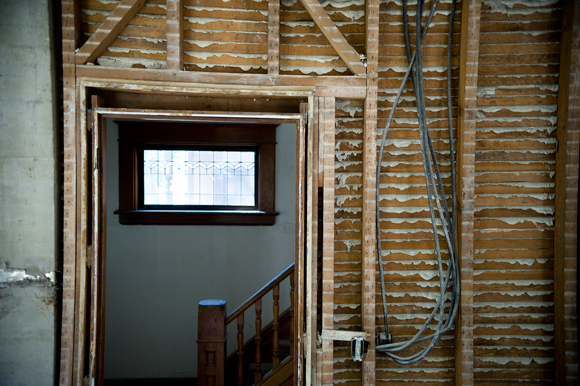The neighborhood house where science and energy efficiency meet
When replacing the furnace and adding insulation is not enough to make a house energy efficient, what next? As HMS Companies explores the answer to that question it’s coming up with some green solutions. Second Wave managing editor Kathy Jennings reports on how the savings could be all yours.
As the cars zip by 1010 Park Street drivers might not realize the house represents a revolutionary way to address energy conservation.
In a part of town where it seems nearly half of the neighboring homes are being restored to their historic beauty, 1010 Park is getting much more than a face lift.
The original wood siding has been uncovered and the coat of green paint that’s going on matches the owners’ green intentions for the house.
It is a demonstration project for Home Marketing Systems Inc. and the company views it as its beacon for what can be done to make houses more energy efficient and living in them more affordable.
Home Marketing Systems, or HMS, is in the business of special services real estate. Among its specialties are property management services, foreclosure services for lenders and consumer information, such as credit reports and nationwide background reports, for prospective landlords and employers.
The company has grown from a two-person property management company in 1984 to a business with six different divisions and 22 employees today. It’s move into the credit end of the business largely insulated HMS from market forces that made real estate an unhappy industry to be in during the last economic downturn.
With the philosophy that diversity is the key to survival, HMS President and CEO Michael Fleckenstein is leading his company into a number of related areas that have made it uniquely qualified to take on the retrofitting of older homes to improve their energy efficiency as its newest venture.
The business also brings together Fleckenstein’s interest in energy that goes back 35 years and his science background (he has a Master’s degree in biology) in ways that could not be realized until recent technological advancements took place.
Now, the property management side of the company works together with the conservation side of the company in a way that makes good business sense, Fleckenstein says. Their goal is to create affordable, comfortable living spaces in neighborhoods full of old historic homes that simply need attention.
In 1010 Park Street, the company found the ideal property to explore why some houses do not respond to traditional methods to making a home more energy efficient. The previous tenants told the company that even though they had turned down the heat and were using only space heaters in the bedrooms they could no longer afford the energy bills.
HMS put in a new furnace and fully insulated the home, only to find heating bills did not budge. What they discovered was taking traditional measures were not effective because they were not the direct cause of the problem.
Different kinds of tests were needed. HMS along with Bartholomew Heating and Cooling performed a blower door test. The test uses a powerful fan to exert mild amounts of negative pressure on the inside of a structure to help expose any inefficient or “leaky” areas and show how much heat was escaping and how air moved through the house. An infra-red thermal imaging test showed also helped identify where the leaks were occurring.
This further investigation uncovered three breaches in the home’s thermal boundary. Such leaks are experienced as drafts in a home and the result is high energy bills.
HMS found a foam product it liked to plug the leaks.
Today, HMS works closely with Eco Foam, a local insulation company. Their sprayed polyurethane foam has an impressive resistance to heat, says Nathan Christensen, Green Projects Coordinator. It also serves as a moisture barrier, sound dampener, can add structural support, and resists mold growth.
When applied, the foam not only cuts out the leaks but is strong enough to add to the structural integrity to the house. It also can be applied without sealing off the natural ventilation needed to keep a house comfortable and healthy.
The 1010 Park Street house has not been through a winter since it has been retrofitted, but the company is confident enough in its methods that seven other homes have received the same treatment.
Now HMS wants to find out more about what goes on when people live in a home that has been retrofitted and is seeking people willing to document information that will help the company get a more full understanding of what adjustments need to be made as the retrofitting program goes forward.
“We’re adding in the human element,” says Fleckenstein. “We’re looking for people willing to live in the house and be part of the study, who will compile energy data.”
A family of four or five who could be expected to display the different behaviors that would affect energy use — for example, the kids turn the thermostat up and Mom turns it down, or the family keeps the heat down and wears sweaters — is what HMS is looking for.
Although the company started with rentals, it has the expertise to do the retrofitting for any homeowner. Part of that expertise is handling the tax credits that can help make the work affordable.
Another energy-related pursuit is Hickory Management division’s Green Housing Initiative — a listing of houses that have been upgraded for better energy conservations and that offer diverse landscaping and programs that allow tenants to recycle and live in a more eco-friendly way. The goal is for Hickory Management to become a leader in providing green housing.
As part of its property management services, HMS also educates tenants on ways they can bring down their energy bills through informational e-mail and its newsletter.
The HMS “Green Housing Initiative” also brings together both Retrofit Shell Technology — the division that handles energy testing, analysis, and solution implementation — and the educational side the provides information in newsletters and email.
When he looks into the future Fleckenstein sees the Hickory Energy Division and the HMS credit division as the parts of the company for which he expects to see the most growth.
He plans to take Hickory Energy Division into energy brokerage. “I used to see energy brokerage as the tail wagging the dog. I’ve become convinced it’s the head of the dog.”
Many times companies cannot afford the changes they need to make for them to become energy efficient. If they can buy energy at a cheaper cost through an energy broker like HMS Hickory Energy Division those savings can go toward building improvements that create energy efficiencies.
At the same time, Fleckenstein sees the credit division expanding its reach across the country, resulting in the hiring of a number of employees with high-end skills.
Kathy Jennings is managing editor of Southwest Michigan’s Second Wave and a freelance writer and editor.
Photos by Erik Holladay
The house at 1010 Park Street is a demonstration for energy efficiency by HMS Companies Inc. The house is being used to demonstrate how property owners can make houses more energy efficient and living in them more affordable.
The front of the house is starting to transform. Passers by can see the old and the new side by side.
Many of the windows have been refurbished with a top and bottom weighted system to open and close them, improving the natural circulation in the home. They also added strips of flexible brass that create a loose seal that prevents air leakage and increases their energy efficiency.
A foam seal was sprayed in between the basement joists. This seals cracks and holes that have appeared over the years in the foundation and increases energy efficiency.

